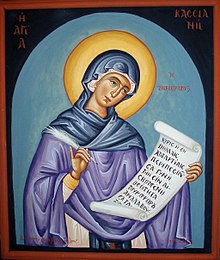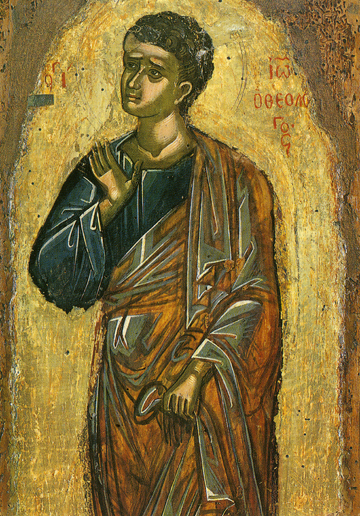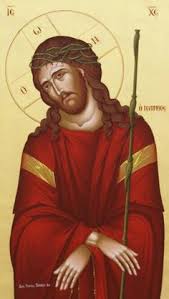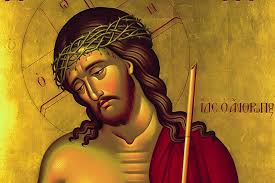Holy Tuesday Evening Bridegroom Matins
Before we get into the Gospel story…
Tonight at the end of the Aposticha we hear the Hymn of  Kassiane, a Ninth Century nun and hymnographer.* She was one of several young women interviewed by Emperor Theophilus as a prospective bride. The story says he was so flummoxed by Kassiane’s beauty that he said something stupid, as men have been known to do: “From a woman came forth the baser instincts”, that is from Eve. Not very romantic, you say? Kassiane who was bright and quick retorted, “Yes, and from a woman came forth the best thing of all”, that is, Christ. Theophilus was embarrassed by his ineptitude, and he chose someone else, but it was said he always regretted it.
Kassiane, a Ninth Century nun and hymnographer.* She was one of several young women interviewed by Emperor Theophilus as a prospective bride. The story says he was so flummoxed by Kassiane’s beauty that he said something stupid, as men have been known to do: “From a woman came forth the baser instincts”, that is from Eve. Not very romantic, you say? Kassiane who was bright and quick retorted, “Yes, and from a woman came forth the best thing of all”, that is, Christ. Theophilus was embarrassed by his ineptitude, and he chose someone else, but it was said he always regretted it.
- Correction: I originally said here that her family came from Ireland, but I can’t find the reference to that anywhere, so for I now I take that back. I’m sorry if I misled anyone.
Kassiane became a nun, founded a monastery near Constantinople, and wrote many hymns, including tonight’s about the sinful woman who anointed Christ. It is said that late in life the Emperor went to the monastery hoping to see Kassiane once more. She hid, leaving her unfinished hymn, her love song to Christ, on the table, and when the Emperor had left she found he had completed it. Perhaps a legend, but it’s a lovely story, and a very lovely hymn – sung here by the Boston Byzantine Choir.
“O Lord God, the woman who had fallen into many sins, having perceived Thy divinity, received the rank of ointment-bearer, offering Thee spices before Thy burial wailing and crying: “Woe is me, for the love of adultery and sin hath given me a dark and lightless night; accept the fountains of my tears. O Thou Who drawest the waters of the sea by the clouds, incline to the sigh of my heart. O Thou Who didst bend the heavens by Thine inapprehendible condescension, I will kiss Thy pure feet and I will wipe them with my tresses. I will kiss Thy feet Whose tread when it fell on the ears of Eve in Paradise dismayed her so that she hid herself for of fear. Who then shall examine the multitude of my sin and the depth of Thy judgment? Wherefore, O my Saviour and the Deliverer of my soul, turn not away from Thy handmaiden, O Thou of boundless mercy”.
Gospel reading:John 12:17-50
Last night we heard Saint Matthew’s account of the end of Jesus’ public ministry. Now we hear John’s version which is quite different.However, I see no discrepancy. Far more happened than could be written down, so all four Gospels are “condensed versions” from different perspectives. Young John had been Jesus’ closest friend and confidante and no doubt got the “inside story”. Also I think John, writing after the others, was adding stories omitted by Matthew, Mark and Luke which he felt were too important to be lost.
All John tells us of the Holy Week confrontations is the final complaint of the Pharisees: “We’re getting nowhere. The world has gone after Him”.
“The world”: Now some Greeks (Greek speaking Jews? or Greeks sympathetic to Judaism?) who were in the city for the feast came saying, “We want to see Jesus”. They went to Philip (a Greek name) who went to Andrew (Andreas, also a Greek name) who told Jesus.
The Lord took this as a sign that his ministry to the Jews was over. Now it was time to move on and give his life for the life of the whole world. “The hour has come for the Son of Man to be glorified.” He will be a grain of wheat that falls to the ground, so it may produce a great harvest.
Kolyva (Κολλυβα in Greek), the wheat which we use at memorials for the  dead was a pre-Christian Greek symbol of new life. (here surrounded by flowers with a picture of the departed loved one) Christ gave it new meaning: He is the seed planted in the earth from which new and greater life springs up – his Death and Resurrection. So shall we be in our death and resurrection.
dead was a pre-Christian Greek symbol of new life. (here surrounded by flowers with a picture of the departed loved one) Christ gave it new meaning: He is the seed planted in the earth from which new and greater life springs up – his Death and Resurrection. So shall we be in our death and resurrection.
He continued: “What shall I say, Father, save me from this hour? No”, said almost to Himself, “This is why I came to this hour. Father glorify thy name.” A voice was heard: “I have glorified it, and I will glorify it again.” Then thunder? the voice of an angel? Jesus said, “This voice has come for your sake…Now is the judgment of this world. Now shall the ruler of this world [Satan] be cast out, and when I am lifted up from the earth I will draw all the world to myself.” And here we are, brothers and sisters, thousands of miles away and twenty centuries later, still drawn to Him by hHs love lifted up on the Cross.
His hearers didn’t understand – little wonder. “But isn’t the Christ supposed to remain forever? Who is this Son of Man? What is this ‘being lifted up'”? He gives no answer. He is done with words. Now he will show them. He says only, “A little while longer the light is with you. Walk in the light while you have the light, that you may become sons of light.” Then he departed and “was hidden from them”. His public ministry was over.
Then John (below as young man) adds his own commentary written many years later when it had become clear that the Jews as a people were not going to believe in Jesus Christ – though He had given them so many signs that He  was their Messiah. John says this fulfilled the prophecy of Isaiah: God has “blinded their eyes, hardened their hearts lest they should see and understand”. But that was no explanation for their unbelief. John had no explanation. Though he adds that even some of the rulers did believe but didn’t admit it, lest they be cast out of the synagog, for “they loved the praise of men more than the praise of God” – and that was even worse.
was their Messiah. John says this fulfilled the prophecy of Isaiah: God has “blinded their eyes, hardened their hearts lest they should see and understand”. But that was no explanation for their unbelief. John had no explanation. Though he adds that even some of the rulers did believe but didn’t admit it, lest they be cast out of the synagog, for “they loved the praise of men more than the praise of God” – and that was even worse.
Then John returns to the story – and this is so poignant it always fills my eyes with tears – Jesus cried out. This was in private. I wonder if only his beloved John was there to hear it and later record it. (This is so poignant it always brings tears to my eyes.) He cried out in grief. He had known from the beginning He would be rejected, but still it hurt. Even if we know something terrible is going to happen, it still hurts, indeed all the worse for knowing it was coming, and this hurt Him so much. But I think it wasn’t only the Jews who caused Him to cry out. It was all who would turn away from Him and His love – and that’s us sometimes, isn’t it?
Jesus looked back and summed up His ministry and His “identity”: “He who believes in me believes in Him who sent me”. “He who sees me sees Him who sent me”. “I have come as light to the world, so people might not walk in darkness”. “If anyone does not believe in me I do not judge him.” I came not to judge but to save. But what  I have spoken will judge him on the last day.” “For I have not spoken on my own authority. I have said only what the Father told me to say, and I know that in it is everlasting life.”
I have spoken will judge him on the last day.” “For I have not spoken on my own authority. I have said only what the Father told me to say, and I know that in it is everlasting life.”
To intentionally reject Jesus Christ and His words is to reject everlasting life. For Christ is God and God is life, and only in God is life. “I am the resurrection, I am life”, He had said. Then He repeats: “I have spoken only what the Father told me to say.” As if, even though He knew what would happen, He couldn’t accept it, couldn’t believe it. How was it possible that they could reject something so beautiful, so life-giving, so true, so obvious? Yet there it was. And it was breaking His heart.
I think this is Jesus at His most human, and this the most heart-wrenching passage in the Gospels.
It was now Tuesday night. Tomorrow Judas will go to the authorities and ask, “What will you give me if I deliver him to you?”
Next: Post: Holy Wednesday Morning Liturgy of the Presanctified Gifts

Hi Father Bill
Thank you for this article.
I have been on an orthodox journey for some time. Starting out with the Celtic saints– who turned out to be orthodox! Who knew
In regards Saint Kassiane, the fact she is Irish and also an Abbess and hymnographer is truly amazing. Do you have any sources that place her as Irish? I would like to bring that up with people who like me started out curious in regards the celtic saints but didn’t see a connection to Orthodoxy
He is Risen!
Murray
Uh oh. I was sure I read about Kassiane being from Ireland – somewhere, but I can’t find where. I googled and searched and finally thought I had found the source, which turned out to be my previous Blog Posts! Not good. Maybe I got her confused with someone else? So for now, I withdraw what I said, and I’ll remove it from that Post. I’m sorry. I hope my perhaps unfounded error hasn’t spread too far. I’m sorry.
Hi Fr. Bill
No worries at all, but I sure hope it’s true. I know after the Norman invasion of England you find English troops fighting for the Emperor against the Norman’s in Italy. So there must have been more comings and goings then thought. I hope this was one of them! If you ever track down a source please let me know!
Blessings to you!
Murray
Indeed there were comings and goings back then that are unimaginable today. Saint Theodore came from Tarsus (home of Saint Paul), fled from the Persians to Constantinople, and from there was appointed Archbishop of Canterbury!
Wow, that is amazing! What year was that?
Thanks Fr. Bill
Murray
St Theodore of Tarsus, b 602, d 6 690. I did not know that by memory! just googled it.
Thanks Fr. Bill
Did some research on him. Found it interesting his rich background coming into play In regards the trouble between the c5eltic and Roman churches in England during his time
I’ll be doing more digging now for sure.
Blessings to you and thanks!
Murray